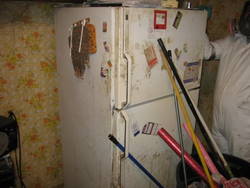Working With Hoarding Situations
 Goals of Recommended Best Practices for Working with People Who Hoard
Goals of Recommended Best Practices for Working with People Who Hoard
- To ensure that the compliance with community accepted standards of health, fire safety and sanitation are followed. See Minimum Acceptable Standards for more information.
- Mental Health Counseling and CPST services should be included in services.
- To provide respectful support to people who hoard to manage their disorder.
- To keep first responders and service providers safe.
- To provide support to those who intervene.
- Confidentiality is to be adhered to by agency confidentiality standards and procedures.
Take Care of Yourself Emotionally
Working with a person who hoards is not for the faint-hearted. It can be very challenging and frustrating. First responders and service providers must take care of themselves first in order to help the individual. This means paying close attention to what is going on with you, and it means getting support from someone who knows what it is to work with persons who hoard.
Each person has his/her own standards of sanitation for their own living situation. If you are either "neat as a pin" or "chronically disorganized" yourself, you may need to seek some help to be able to maintain a middle ground with the person who hoards. In some cases you will also need to be prepared to encounter a person who hoards who is also an exhibitionist. As a "helper", you may see some initial progress in cleaning up the premises, but eventually you will likely become irritated and disappointed by the slow rate of progress and the backsliding. When this happens, it is time for you to step away temporarily to regroup so that you can work effectively again.
Note to Supervisors: it is critical that you prepare and debrief with your staff who will work with individuals who hoard.
Take Care of Yourself Physically
Besides being unpleasant to be in, hoarding situations can be unsafe. Some first responders and service providers develop infections and suffer long-term symptoms from being in hoarding situations. Some general precautions you should take when you expect to be in a hoarding situation include (many of these are in severe cases only, please take note of concerns you may have, including pre-existing conditions such as breathing disorders):
- To minimize slips and falls on slippery floors, wear "solid" shoes and socks; no sandals, flats, or heels.
- Carry a change of clothes, disposable gloves and anti-bacterial hand sanitizers with you.
- Remember to not show any emotional reaction to the person or place.
- As you approach the residence, be aware of your surroundings.
- If there are animals, ask the person to contain them. If there are many animals, you may not want to enter the premises at all.
- If you see that the situation is unsanitary and unsafe, speak with the person outside. Be creative and flexible. Take a walk; sit in the backyard, etc.
- Don’t touch anything. Stirring up dust can result in respiratory infections.
- Housing enforcement personnel and others who will be assessing and working in the situation should have respirators (dust masks are not sufficient).
- When you enter the premises, look up as well as forward and down. Often there are unsafe and unsanitary circumstances on the ceiling.
- When you leave the premises, stand or walk outside for a few minutes to breathe fresh air and remove debris. Remove your clothes as soon as you get to your office or house and put on fresh clean clothes. Leave the clothes you had on outside for at least an hour to help rid them of any "guests." Clothes used at site of hoarding should be cleaned, or heated, to 110 degrees F to kill bugs, eggs, and bed bugs (put in dryer first before washing).
- If you experience any symptoms following your visit to the premises, see your doctor, and advise him/her that you were in the home of a person who hoards..
- If you are experiencing any emotional distress, see a counselor or therapist as soon as possible.
